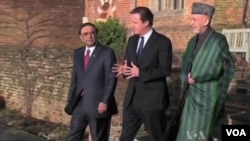This week's pledge from Afghan President Hamid Karzai and his Pakistani counterpart, Asif Ali Zardari, to start peace talks with the Taliban within the next six months marks the first definitive target in the reconciliation process. There are questions about what, if any, role the United States will play in the talks.
The Afghan government's pursuit of peace with the Taliban has been a drawn-out affair stretching over the last few years. Various Taliban intermediaries have spoken with Kabul, but so far neither side has publicly given ground on its demands.
One of the Taliban's biggest demands is that all foreign forces leave the country. And after more than a decade of fighting, war-weary NATO countries are more than willing to comply.
According to NATO, the international coalition has already transferred 87 percent of security control to the Afghan forces. But if peace talks with the Taliban do start within the next six months in Qatar, NATO forces - including U.S. troops - will still be fighting in Afghanistan.
Ismail Qasim Yar is the head of international relations for the Afghan High Peace Council, Kabul's representative in the negotiations with the Taliban. He said the presence of foreign troops should not have a major effect.
He says that at a minimum, the six-month time frame should be enough to start talks, especially considering that Afghanistan's neighbor Pakistan, a country with historic ties to the Taliban, is on board is part of the negotiations.
Earlier this week, State Department spokeswoman Victoria Nuland said the United States would continue to defer to Kabul.
"We are committed ourselves to support an Afghan-led process. The goal for everyone should be an inclusive political order in a strong, unified, sovereign Afghanistan," Nuland said.
Ronald Neumann, a former U.S. ambassador to Afghanistan, says that this does not mean the United States will play a marginal role in the peace talks. But Washington can only do so much.
"Our purpose, as I understand it, has always been to bring the other parties together. All of the actual conditions have to be about how the Taliban and Afghan people will live together and whether an agreement is one that can be accepted by all Afghans. Those are things that Afghans have to decide. Those are not things the U.S. should decide," Neuman said.
Even if the U.S. military support in Afghanistan helps force the Taliban to the table this year, Neumann says the complete NATO pullout scheduled for 2014 really puts the pressure on the Afghans to guide the peace process.
"As U.S. troops go down and mostly leave, the agreement - whatever agreement comes, if an agreement comes - has to be one in which Afghans have confidence that it will be kept," Neuman said.
But this will be difficult, considering the Taliban in Afghanistan is by no means an monolithic entity. The success of any deal will rely on the acquiescence of numerous local warlords and militant commanders with various ties to al-Qaida - everyone who gathered under the umbrella of the Taliban to fight against the Afghan government and NATO forces.
The Afghan government's pursuit of peace with the Taliban has been a drawn-out affair stretching over the last few years. Various Taliban intermediaries have spoken with Kabul, but so far neither side has publicly given ground on its demands.
One of the Taliban's biggest demands is that all foreign forces leave the country. And after more than a decade of fighting, war-weary NATO countries are more than willing to comply.
According to NATO, the international coalition has already transferred 87 percent of security control to the Afghan forces. But if peace talks with the Taliban do start within the next six months in Qatar, NATO forces - including U.S. troops - will still be fighting in Afghanistan.
Ismail Qasim Yar is the head of international relations for the Afghan High Peace Council, Kabul's representative in the negotiations with the Taliban. He said the presence of foreign troops should not have a major effect.
He says that at a minimum, the six-month time frame should be enough to start talks, especially considering that Afghanistan's neighbor Pakistan, a country with historic ties to the Taliban, is on board is part of the negotiations.
Earlier this week, State Department spokeswoman Victoria Nuland said the United States would continue to defer to Kabul.
"We are committed ourselves to support an Afghan-led process. The goal for everyone should be an inclusive political order in a strong, unified, sovereign Afghanistan," Nuland said.
Ronald Neumann, a former U.S. ambassador to Afghanistan, says that this does not mean the United States will play a marginal role in the peace talks. But Washington can only do so much.
"Our purpose, as I understand it, has always been to bring the other parties together. All of the actual conditions have to be about how the Taliban and Afghan people will live together and whether an agreement is one that can be accepted by all Afghans. Those are things that Afghans have to decide. Those are not things the U.S. should decide," Neuman said.
Even if the U.S. military support in Afghanistan helps force the Taliban to the table this year, Neumann says the complete NATO pullout scheduled for 2014 really puts the pressure on the Afghans to guide the peace process.
"As U.S. troops go down and mostly leave, the agreement - whatever agreement comes, if an agreement comes - has to be one in which Afghans have confidence that it will be kept," Neuman said.
But this will be difficult, considering the Taliban in Afghanistan is by no means an monolithic entity. The success of any deal will rely on the acquiescence of numerous local warlords and militant commanders with various ties to al-Qaida - everyone who gathered under the umbrella of the Taliban to fight against the Afghan government and NATO forces.




